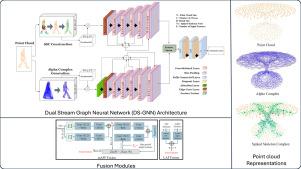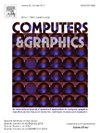Learning geometric complexes for 3D shape classification
IF 2.5
4区 计算机科学
Q2 COMPUTER SCIENCE, SOFTWARE ENGINEERING
引用次数: 0
Abstract
Geometry and topology are vital elements in discerning and describing the shape of an object. Geometric complexes constructed on the point cloud of a 3D object capture the geometry as well as topological features of the underlying shape space. Leveraging this aspect of geometric complexes, we present an attention-based dual stream graph neural network (DS-GNN) for 3D shape classification. In the first stream of DS-GNN, we introduce spiked skeleton complex (SSC) for learning the shape patterns through comprehensive feature integration of the point cloud’s core structure. SSC is a novel and concise geometric complex comprising principal plane-based cluster centroids complemented with per-centroid spatial locality information. The second stream of DS-GNN consists of alpha complex which facilitates the learning of geometric patterns embedded in the object shapes via higher dimensional simplicial attention. To evaluate the model’s response to different shape topologies, we perform a persistent homology-based object segregation that groups the objects based on the underlying topological space characteristics quantified through the second Betti number. Our experimental study on benchmark datasets such as ModelNet40 and ScanObjectNN shows the potential of the proposed GNN for the classification of 3D shapes with different topologies and offers an alternative to the current evaluation practices in this domain.

学习用于三维形状分类的几何复合物
几何和拓扑是辨别和描述物体形状的重要元素。在三维物体点云上构建的几何复合体可以捕捉底层形状空间的几何和拓扑特征。利用几何复合物的这一特点,我们提出了一种基于注意力的双流图神经网络(DS-GNN),用于三维形状分类。在 DS-GNN 的第一流中,我们引入了尖峰骨架复合体(SSC),通过对点云核心结构的综合特征整合来学习形状模式。SSC 是一种新颖简洁的几何复合体,由基于主平面的聚类中心点和每个中心点的空间位置信息组成。DS-GNN 的第二流由阿尔法复合体组成,它通过高维简约注意力促进学习嵌入在物体形状中的几何模式。为了评估模型对不同形状拓扑结构的响应,我们进行了基于持久同源性的物体分离,根据通过第二个贝蒂数量化的底层拓扑空间特征对物体进行分组。我们在 ModelNet40 和 ScanObjectNN 等基准数据集上进行的实验研究表明,所提出的 GNN 具有对具有不同拓扑结构的三维形状进行分类的潜力,并为该领域当前的评估实践提供了一种替代方案。
本文章由计算机程序翻译,如有差异,请以英文原文为准。
求助全文
约1分钟内获得全文
求助全文
来源期刊

Computers & Graphics-Uk
工程技术-计算机:软件工程
CiteScore
5.30
自引率
12.00%
发文量
173
审稿时长
38 days
期刊介绍:
Computers & Graphics is dedicated to disseminate information on research and applications of computer graphics (CG) techniques. The journal encourages articles on:
1. Research and applications of interactive computer graphics. We are particularly interested in novel interaction techniques and applications of CG to problem domains.
2. State-of-the-art papers on late-breaking, cutting-edge research on CG.
3. Information on innovative uses of graphics principles and technologies.
4. Tutorial papers on both teaching CG principles and innovative uses of CG in education.
 求助内容:
求助内容: 应助结果提醒方式:
应助结果提醒方式:


